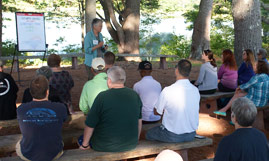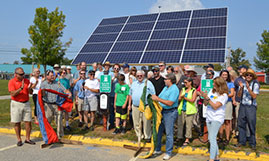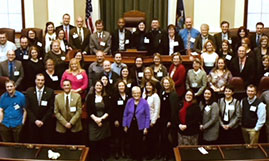AUGUSTA, Maine – December 9, 2020 – The nonpartisan Maine Economic Growth Council today released its 26th annual Measures of Growth Report, a comprehensive snapshot of how the state’s economy is performing relative to our long-term goals, to other states, and the U.S. as a whole. The Report finds reason for renewed urgency in the face of COVID-19, the resulting recession, and persistent systemic racism: the pandemic and resulting missed paychecks, closed schools, and shuttered businesses tipped many Maine households into stressful, precarious situations and hit non-white, low-income, and rural households disproportionately hard. It also finds that overall, there is reason for optimism: even amidst the unprecedented challenges 2020 unleashed — Maine’s quality of place is attracting new residents, recent research has identified growth opportunities where Maine’s strengths align with growing global demand, and a promising new approach to economic development seeks to cultivate these opportunities.
“This Report reflects the lessons and challenges of 2020 while also highlighting the opportunity of Maine’s innovative spirit, resilience and collaborative mindset,” says Steve Von Vogt, Chair of the Maine Economic Growth Council. “In March, thousands of Maine businesses quickly modified their operations to protect staff and customers. We relearned the power of science, innovation, and public-private partnerships. Maine business, community and non-profit leaders of all races and ethnicities began joining forces privately and publically to work toward diversity, equity, and inclusion in our communities and economy. In the face of disruption and distress, Measures of Growth is more important than ever in helping us understand Maine’s long term assets and challenges, so we prioritize and sustain the investments that can help us recover and return to prosperity.”
In total, the 2020 Measures of Growth Report tracks 29 indicators that represent Maine’s assets and areas of persistent challenge. In order to better reflect current circumstances, the report has a new measure: Racial/Ethnic Income Equity whichreveals persistent income and poverty disparities between Maine’s white households and those of all other races and ethnicities. Responding to these realities will require honesty, openness to unbiased data and analysis, and a long-term strategy to grow Maine’s economy in ways that benefit all Maine people. We have also included a second new Indicator, Prekindergarten Education, and changed two metrics to better focus on the key dynamics at play: Per Capita Personal Income is now Wages, and Working Age Population is now Workforce.
Overall, Maine made measurable progress on 9 indicators, lost ground versus the benchmark on 14 others, and held its ground on the remaining 6 indicators.
The Council assigns Gold Stars for significant progress in:
- Prekindergarten Education: In 2019-2020, 46% of Maine four-year-olds were enrolled in public pre-K in 2018-19, well above the U.S. and New England averages. The Council noted that this progress is laudable but needs to be sustained.
- Safety: Maine’s crime rate in 2018 was 43% below the national rate and among the lowest of the 50 states.
- Air Quality: Maine’s air qualityis better than other Northeastern states. The number of moderate (23) and low (1) air quality days in 2019 were the lowest on record.
The Council assigns Red Flags for needed attention to:
- Racial/Ethnic Income Equity: From 2014 to 2018, the average per-capita income for White non-Hispanic Mainers was 60% higher than Maine residents of all other races and ethnicities.
- Workforce: From 2018 to 2019, the workforce shrank by 2,900 people.
- Value-Added per Worker: Worker productivity in Maine is among the lowest of the 50 states.
- Research and Development Expenditures: In 2017, Maine’s total spending on R&D was 0.8% of total GDP, which ranks 46th of the 50 states
- Cost of Doing Business: In 2019, Maine’s cost of doing business ranked 7th highest in the U.S., ranking worse than New Hampshire, Rhode Island, and Connecticut.
- 8th Grade Math: 34% of Maine 8th-graders tested proficient on NAEP in 2019, down from 40% in 2013 and at the same level as in 2007. The New England average was 38% in 2019.
This updated version of the report better aligns with two other new, groundbreaking, and key pillars for stabilizing and rebuilding Maine’s economy moving forward: Maine’s Ten-Year Economic Strategy which charts a course for creating jobs and increasing prosperity through talent and innovation, and Governor Mills’ Economic Recovery Committee (ERC) report that includes recommendations to help Maine regain its footing and return to its previous growth path once the COVID-19 pandemic has subsided.
“The Measures of Growth annual report has long provided valuable information about what we are doing right, where we need to improve, and the trends of progress or decline over time,” says Yellow Light Breen, MDF’s President and CEO. “Improving Maine’s economy requires both brutal honesty and unquenchable optimism. The indicators reinforce that talent, innovation, and infrastructure must be the focus for strategic investment – while also maintaining public health, a clean environment and vibrant communities. We look forward to the opportunity to work with policymakers, businesses, and community leaders to stabilize, diversify and rebuild a Maine economy that is inclusive and delivers on the Council’s vision of a high-quality of life for all Mainers.”
The Maine Economic Growth Council takes a nonpartisan, data-driven approach to presenting an unbiased picture of Maine’s economy and well-being. Measures of Growth is designed to be a resource for policy and decision makers at all levels, helping them to focus their efforts and understand the connections between the major issues affecting the state. Since 1993, the Council has served as an unbiased analyst and advisor of Maine’s economic health and status, and is administered by the Maine Development Foundation (MDF). Council members are jointly appointed by the Governor, Senate President, and Speaker of the House, and represent a broad and diverse cross-section of Maine’s key constituencies.
Click here to read the Full Report
Click here to read the Executive Summary
Click here to watch the Dec. 9, 2020 Virtual Press Conference
###










